- Home
- Cassandra Clare
Clockwork Prince tid-2 Page 15
Clockwork Prince tid-2 Read online
Page 15
“Let me go,” she said, under her breath.
“This is part of your training,” said Gabriel in a bored voice. “Besides, look at my brother and Miss Collins. She isn’t complaining.”
She glanced across the room at Sophie, who seemed earnestly engaged in her lesson with Gideon. He was standing behind her, one arm around her from the back, showing her how to hold a needle-tipped throwing knife. His hand was gently cupped around hers, and he appeared to be speaking to the back of her neck, where her dark hair had escaped from its tight chignon and curled becomingly. When he saw Tessa looking at them, he flushed.
Tessa was amazed. Gideon Lightwood, blushing! Had he been admiring Sophie? Apart from her scar, which Tessa barely noticed anymore, she was lovely, but she was a mundane, and a servant, and the Lightwoods were awful snobs. Tessa’s insides felt suddenly tight. Sophie had been treated abominably by her previous employer. The last thing she needed was some pretty Shadowhunter boy taking advantage of her.
Tessa looked around, about to say something to the boy with his arms around her—and stopped. She had forgotten that it was Gabriel beside her, not Jem. She had grown so used to Jem’s presence, the ease with which she could converse with him, the comfort of his hand on her arm when they walked, the fact that he was the only person in the world now she felt she could say absolutely anything to. She realized with surprise that though she had just seen him at breakfast, she missed him, with what felt almost like an ache inside.
She was so caught up in this mixture of feelings—missing Jem, and a sense of passionate protectiveness over Sophie—that her next throw went wide by several feet, flying by Gideon’s head and bouncing off the windowsill.
Gideon looked calmly from the fallen knife to his brother. Nothing seemed to bother him, not even his own near decapitation. “Gabriel, what is the problem, exactly?”
Gabriel turned his gaze on Tessa. “She won’t listen to me,” he said spitefully. “I can’t instruct someone who won’t listen.”
“Maybe if you were a better instructor, she’d be a better listener.”
“And maybe you would have seen the knife coming,” said Gabriel, “if you paid more attention to what’s going on around you and less to the back of Miss Collins’s head.”
So even Gabriel had noticed, Tessa thought, as Sophie blushed. Gideon gave his brother a long, steady look—she sensed there would be words between the two of them at home—then turned to Sophie and said something in a low voice, too low for Tessa to hear.
“What’s happened to you?” she said under her breath to Gabriel, and felt him stiffen.
“What do you mean?”
“You’re usually patient,” she said. “You’re a good teacher, Gabriel, most of the time, but today you’re snappish and impatient and . . .” She looked down at his hand on her arm. “Improper.”
He had the good grace to release her, looking ashamed of himself. “A thousand pardons. I should not have touched you like that.”
“No, you shouldn’t. And after the way you criticize Will—”
He flushed along his high cheekbones. “I’ve apologized, Miss Gray. What more do you want of me?”
“A change in behavior, perhaps. An explanation of your dislike of Will—”
“I’ve told you! If you wish to know why I dislike him, you can ask him yourself!” Gabriel whirled and stalked out of the room.
Tessa looked at the knives stuck into the wall and sighed. “So ends my lesson.”
“Try not to be too put out,” said Gideon, approaching her with Sophie by his side. It was very odd, Tessa thought; Sophie usually seemed uneasy around men, any men, even gentle Henry. With Will she was like a scalded cat, and with Jem, blushing and watchful, but beside Gideon she seemed . . .
Well, it was hard to define. But it was most peculiar.
“It is not your fault he is like this today,” Gideon went on. His eyes on Tessa were steady. This close up she could see that they were not precisely the same color as his brother’s. They were more of a gray-green, like the ocean under a cloudy sky. “Things have been . . . difficult for us at home with Father, and Gabriel is taking it out on you, or, really, anyone who happens to be nearby.”
“I’m most sorry to hear that. I hope your father is well,” murmured Tessa, praying she would not be stricken down on the spot for this blatant falsehood.
“I suppose I had better go after my brother,” said Gideon without answering her question. “If I do not, he will take the carriage and leave me stranded. I hope to have him back to you at our next session in a better humor.” He bowed to Sophie, then Tessa. “Miss Collins, Miss Gray.”
And he was gone, leaving both girls looking after him in mingled confusion and surprise.
With the training session mercifully over, Tessa found herself hurrying to change back into her ordinary clothes, and then to lunch, eager to see if Will had returned. He hadn’t. His chair, between Jessamine and Henry, still sat empty—but there was someone new in the room, someone who made Tessa stop short at the doorway, trying not to stare. A tall man, he sat near the head of the table beside Charlotte, and was green. Not a very dark green—his skin had a faint greenish sheen to it, like light reflecting off the ocean, and his hair was snowy white. From his forehead curled two small elegant horns.
“Miss Tessa Gray,” said Charlotte, making the introductions, “this is the High Warlock of London, Ragnor Fell. Mr. Fell, Miss Gray.”
After murmuring that she was delighted to meet him, Tessa sat down at the table beside Jem, diagonally from Fell, and tried not to stare at him out of the corner of her eye. As Magnus’s cat’s eyes were his warlock’s mark, Fell’s would be his horns and tinted skin. She couldn’t help being fascinated by Downworlders still, warlocks in particular. Why were they marked and she wasn’t?
“What’s on the carpet, then, Charlotte?” Ragnor was saying. “Did you really call me out here to discuss dark doings on the Yorkshire moors? I was under the impression that nothing of great interest ever happened in Yorkshire. In fact, I was under the impression that there was nothing in Yorkshire except sheep and mining.”
“So you never knew the Shades?” Charlotte inquired. “The warlock population of Britain is not so large . . .”
“I knew them.” As Fell sawed into the ham on his plate, Tessa saw that he had an extra joint to each finger. She thought of Mrs. Black, with her elongated taloned hands, and repressed a shudder. “Shade was a little mad, with his obsession with clockwork and mechanisms. Their death was a shock to Downworld. The ripples of it went through the community, and there was even some discussion of vengeance, though none, I believe, was ever taken.”
Charlotte leaned forward. “Do you remember their son? Their adopted child?”
“I knew of him. A married warlock couple is rare. One who adopts a human child from an orphanage is rarer still. But I never saw the boy. Warlocks—we live forever. A gap of thirty, even fifty, years between meetings is not unusual. Of course now that I know what the boy grew up to be, I wish I had met him. Do you think there is value in attempting to discover who his true parents were?”
“Certainly, if it can be discovered. Whatever information we can glean about Mortmain could be useful.”
“I can tell you he gave himself that name,” said Fell. “It sounds like a Shadowhunter name. It is the sort of name someone with a grudge against Nephilim, and a dark sense of humor, would take. Mort main—”
“Hand of death,” supplied Jessamine, who was proud of her French.
“It does make one wonder,” said Tessa. “If the Clave had simply given Mortmain what he wanted—reparations—would he still have become what he did? Would there ever have been a Pandemonium Club at all?”
“Tessa—,” Charlotte began, but Ragnor Fell waved her silent. He gazed amusedly down the table at Tessa. “You’re the shape-changer, aren’t you?” he said. “Magnus Bane told me about you. No mark on you at all, they say.”
Tessa swallowed and looked h
im straight in the eye. They were discordantly human eyes, ordinary in his extraordinary face. “No. No mark.”
He grinned around his fork. “I do suppose they’ve looked everywhere?”
“I’m sure Will’s tried,” said Jessamine in a bored tone. Tessa’s silverware clattered to her plate. Jessamine, who had been mashing her peas flat with the side of her knife, looked up when Charlotte let out an aghast, “Jessamine!”
Jessamine shrugged. “Well, he’s like that.”
Fell turned back to his plate with a faint smile on his face. “I remember Will’s father. Quite the ladies’ man, he was. They couldn’t resist him. Until he met Will’s mother, of course. Then he threw it all in and went to live in Wales just to be with her. What a case he was.”
“He fell in love,” said Jem. “It isn’t that peculiar.”
“‘Fell’ into it,” said the warlock, still with the same faint smile. “Hurtled into it is more like. Headlong-crashed into it. Still, there are always some men like that—just one woman for them, and only she will do, or nothing.”
Charlotte looked over at Henry, but he appeared completely lost in thought, counting something—though who knew what—off on his fingers. He was wearing a pink and violet waistcoat today, and had gravy on his sleeve. Charlotte’s shoulders slumped visibly, and she sighed. “Well,” she said. “By all accounts they were very happy together—”
“Until they lost two of their three children and Edmund Herondale gambled away everything they had,” said Fell. “But I imagine you never told young Will about that.”
Tessa exchanged a glance with Jem. My sister is dead, Will had said. “They had three children, then?” she said. “Will had two sisters?”
“Tessa. Please.” Charlotte looked uneasy. “Ragnor . . . I never hired you to invade the privacy of the Herondales, or Will. I did it because I had promised Will I would tell him if harm came to his family.”
Tessa thought of Will—a twelve-year-old Will, clinging to Charlotte’s hand, begging to be told if his family died. Why run? she thought for the hundredth time. Why put them behind you? She had thought perhaps he did not care, but clearly he had cared. Cared still. She could not stop the tightening at her heart as she thought of him calling out for his sister. If he loved Cecily as she had once loved Nate . . .
Mortmain had done something to his family, she thought. As he had to hers. That bound them to each other in a peculiar way, she and Will. Whether he knew it or not.
“Whatever it is that Mortmain has been planning,” she heard herself say, “he has been planning it a long time. Since before I was born, when he tricked or coerced my parents into ‘making’ me. And now we know that years ago he involved himself with Will’s family and moved them to Ravenscar Manor. I fear we are like chess pieces he slides about a board, and the outcome of the game is already known to him.”
“That is what he desires us to think, Tessa,” said Jem. “But he is only a man. And each discovery we make about him makes him more vulnerable. If we were no threat, he would not have sent that automaton to warn us off.”
“He knew exactly where we would be—”
“There is nothing more dangerous than a man bent on revenge,” said Ragnor. “A man who has been bent on it for nearly three score years, who has nurtured it from a tiny, poisonous seed to a living, choking flower. He will see it through, unless you end him first.”
“Then, we will end him,” said Jem shortly. It was as close to a threat as Tessa had ever heard him make.
Tessa looked down at her hands. They were a paler white than they had been when she lived in New York, but they were her hands, familiar, the index finger slightly longer than the middle one, the half-moons of her nails pronounced. I could Change them, she thought. I could become anything, anyone. She had never felt more mutable, more fluid, or more lost.
“Indeed.” Charlotte’s tone was firm. “Ragnor, I want to know why the Herondale family is in that house—that house that belonged to Mortmain—and I want to see to it that they are safe. And I want to do it without Benedict Lightwood or the rest of the Clave hearing about it.”
“I understand. You want me to look out for them as quietly as possible while also making inquiries regarding Mortmain in the area. If he moved them there, it must have been for a purpose.”
Charlotte exhaled. “Yes.”
Ragnor twirled his fork. “That will be expensive.”
“Yes,” Charlotte said. “I am prepared to pay.”
Fell grinned. “Then, I am prepared to endure the sheep.”
The rest of the lunch passed in awkward conversation, with Jessamine moodily destroying her food without eating it, Jem unusually quiet, Henry muttering equations to himself, and Charlotte and Fell finalizing their plans for the protection of Will’s family. As much as Tessa approved of the idea—and she did—there was something about the warlock that made her uncomfortable in a way Magnus never had, and she was glad when lunch was over and she could escape to her room with a copy of The Tenant of Wildfell Hall.
It was not her favorite of the Brontë sisters’ books—that honor went to Jane Eyre, and then Wuthering Heights, with Tenant a distant third—but she had read the other two so many times that no surprises lay between the pages, only phrases so familiar to her they had become like old friends. What she really wanted to read was A Tale of Two Cities, but Will had quoted Sydney Carton to her enough times that she was afraid that picking it up would make her think of him, and make the weight of her nervousness greater. After all, it was never Darnay he quoted, only Sydney, drunk and wrecked and dissipated. Sydney, who died for love.
It was dark out, and the wind was blowing gusts of light rain against the windowpanes when the knock came at her door. It was Sophie, carrying a letter on a silver tray. “A letter for you, miss.”
Tessa put the book down in astonishment. “Mail for me?”
Sophie nodded and came closer, holding out the tray. “Yes, but it doesn’t say who it’s from. Miss Lovelace almost snatched it, but I managed to keep it from her, nosy thing.”
Tessa took the envelope. It was addressed to her, indeed, in a slanting, unfamiliar hand, printed on heavy cream-colored paper. She turned it over once, began to open it, and caught sight of Sophie’s wide-eyed curious gaze reflected in the window. She turned and smiled at her. “That will be all, Sophie,” she said. It was the way she had read heroines dismissing servants in novels, and it seemed to be correct. With a disappointed look Sophie took her salver and retired from the room.
Tessa unfolded the letter and spread it out on her lap.
Dear sensible Miss Gray,
I write to you on behalf of a mutual friend, one William Herondale. I know that it is his habit to come and go—most often go—from the Institute as he pleases, and that therefore it may be some time before any alarm is raised at his absence. But I ask you, as one who holds your good sense in esteem, not to assume this absence to be of the ordinary sort. I saw him myself last night, and he was, to say the least, distraught when he left my residence. I have reason for concern that he might do himself an injury, and therefore I suggest that his whereabouts be sought and his safety ascertained. He is a difficult young man to like, but I believe you see the good in him, as I do, Miss Gray, and that is why I humbly address my letter to you—
Your servant,
Magnus Bane
Postscript: If I were you, I would not share the contents of this letter with Mrs. Branwell. Just a suggestion.
M.B.
Though reading Magnus’s letter made her feel as if her veins were full of fire, somehow Tessa survived the rest of the afternoon, and dinner as well, without—she thought—betraying any outward sign of her distress. It seemed to take Sophie an agonizingly long time to help her out of her dress, brush her hair, stoke the fire, and tell her the day’s gossip. (Cyril’s cousin worked in the Lightwoods’ house and had reported that Tatiana—Gabriel and Gideon’s sister—was due to return from her honeymoon on the Continent with
her new husband any day now. The household was in an uproar as she was rumored to have a most unpleasant disposition.)
Tessa muttered something about how she must take after her father that way. Impatience made her voice a croak, and Sophie was only just prevented from rushing out to get her a tisane of mint by Tessa’s insistence that she was exhausted, and needed sleep more than she needed tea.
The moment the door shut behind Sophie, Tessa was on her feet, shimmying out of her nightclothes and into a dress, lacing herself up as best she could and throwing a short jacket on over the top. After a cautious glance out into the corridor, she slipped out of her room and across the hall to Jem’s door, where she knocked as quietly as she could. For a moment nothing happened, and she had the fleeting worry that he had already gone to sleep, but then the door flew open and Jem stood on the threshold.
She had clearly caught him in the middle of readying himself for bed; his shoes and jacket were off, his shirt open at the collar, his hair an adorable rumpled mess of silver. She wanted to reach out and smooth it down. He blinked at her. “Tessa?”
Without a word she handed him the note. He glanced up and down the corridor, then gestured her inside the room. She shut the door behind him as he read Magnus’s scrawl once, and then again, before balling it up in his hand, the crackling paper loud in the room. “I knew it,” he said.
It was Tessa’s turn to blink. “Knew what?”
“That this wasn’t an ordinary sort of absence.” He sat down on the trunk at the foot of his bed and shoved his feet into his shoes. “I felt it. Here.” He put his hand over his chest. “I knew there was something strange. I felt it like a shadow on my soul.”
“You don’t think he’d really hurt himself, do you?”
“Hurt himself, I don’t know. Put himself in a situation where he might be hurt—” Jem stood up. “I should go.”

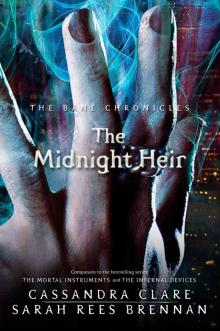 The Midnight Heir
The Midnight Heir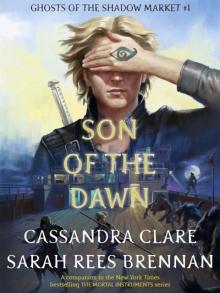 Son of the Dawn
Son of the Dawn Angels Twice Descending
Angels Twice Descending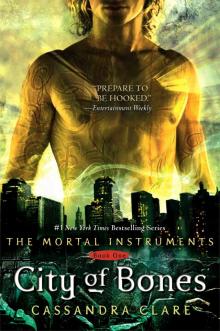 City of Bones
City of Bones Vampires, Scones, and Edmund Herondale
Vampires, Scones, and Edmund Herondale Bitter of Tongue
Bitter of Tongue What Really Happened in Peru
What Really Happened in Peru Shadowhunters and Downworlders
Shadowhunters and Downworlders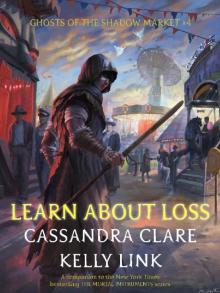 Learn About Loss
Learn About Loss What to Buy the Shadowhunter Who Has Everything
What to Buy the Shadowhunter Who Has Everything Welcome to Shadowhunter Academy
Welcome to Shadowhunter Academy Nothing but Shadows
Nothing but Shadows Clockwork Prince
Clockwork Prince The Fiery Trial
The Fiery Trial City of Glass
City of Glass Clockwork Angel
Clockwork Angel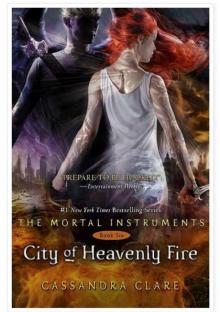 City of Heavenly Fire
City of Heavenly Fire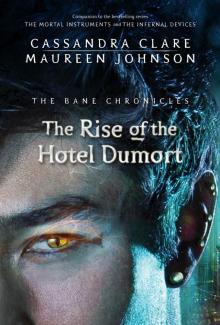 The Rise of the Hotel Dumort
The Rise of the Hotel Dumort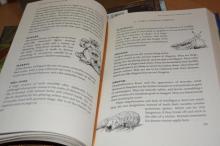 The Shadowhunters Codex
The Shadowhunters Codex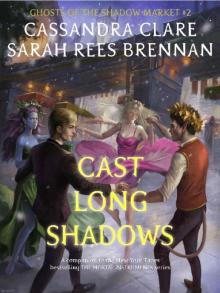 Cast Long Shadows
Cast Long Shadows City of Lost Souls
City of Lost Souls Lady Midnight
Lady Midnight Lord of Shadows
Lord of Shadows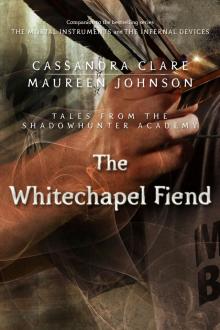 The Whitechapel Fiend
The Whitechapel Fiend City of Fallen Angels
City of Fallen Angels Clockwork Princess
Clockwork Princess Queen of Air and Darkness
Queen of Air and Darkness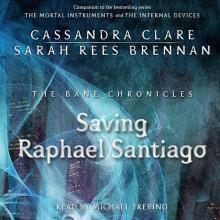 Saving Raphael Santiago
Saving Raphael Santiago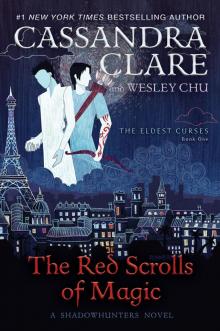 The Red Scrolls of Magic
The Red Scrolls of Magic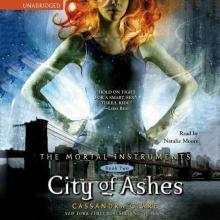 City of Ashes
City of Ashes Pale Kings and Princes
Pale Kings and Princes The Runaway Queen
The Runaway Queen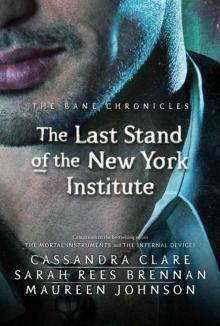 The Last Stand of the New York Institute
The Last Stand of the New York Institute A Long Conversation (The Shadowhunter Chronicles)
A Long Conversation (The Shadowhunter Chronicles) The Lost Book of the White
The Lost Book of the White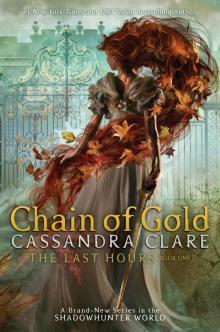 Chain of Gold
Chain of Gold The Fall of the Hotel Dumort
The Fall of the Hotel Dumort Born to Endless Night
Born to Endless Night The Lost Herondale
The Lost Herondale An Illustrated History of Notable Shadowhunters & Denizens of Downworld
An Illustrated History of Notable Shadowhunters & Denizens of Downworld Ghosts of the Shadow Market
Ghosts of the Shadow Market Through Blood, Through Fire
Through Blood, Through Fire Every Exquisite Thing
Every Exquisite Thing City of Fallen Angels mi-4
City of Fallen Angels mi-4 The Land I Lost (Ghosts of the Shadow Market Book 7)
The Land I Lost (Ghosts of the Shadow Market Book 7) Queen of Air and Darkness (The Dark Artifices #3)
Queen of Air and Darkness (The Dark Artifices #3) The Wicked Ones (Ghosts of the Shadow Market Book 6)
The Wicked Ones (Ghosts of the Shadow Market Book 6) The Wicked Ones
The Wicked Ones A Deeper Love
A Deeper Love City of Fallen Angels (4)
City of Fallen Angels (4) The Evil We Love (Tales from the Shadowhunter Academy Book 5)
The Evil We Love (Tales from the Shadowhunter Academy Book 5) Vampires, Scones, and Edmund Herondale tbc-3
Vampires, Scones, and Edmund Herondale tbc-3 City of Glass mi-3
City of Glass mi-3 Tales from the Shadowhunter Academy
Tales from the Shadowhunter Academy The Infernal Devices Series
The Infernal Devices Series City of Ashes mi-2
City of Ashes mi-2 Cassandra Clare: The Mortal Instruments Series
Cassandra Clare: The Mortal Instruments Series The Bane Chronicles 7: The Fall of the Hotel Dumort
The Bane Chronicles 7: The Fall of the Hotel Dumort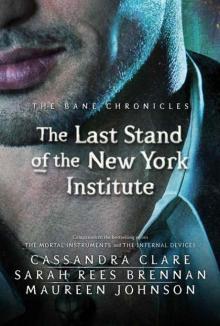 The Last Stand of the New York Institute (The Bane Chronicles)
The Last Stand of the New York Institute (The Bane Chronicles) The Land I Lost
The Land I Lost![Saving Raphael Santiago - [Bane Chronicles 06] Read online](http://i1.bookreadfree.com/i1/04/03/saving_raphael_santiago_-_bane_chronicles_06_preview.jpg) Saving Raphael Santiago - [Bane Chronicles 06]
Saving Raphael Santiago - [Bane Chronicles 06] Clockwork Angel tid-1
Clockwork Angel tid-1 The Runaway Queen tbc-2
The Runaway Queen tbc-2 The Bane Chronicles
The Bane Chronicles City of Lost Souls mi-5
City of Lost Souls mi-5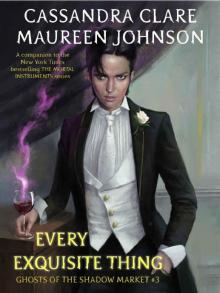 Every Exquisite Thing (Ghosts of the Shadow Market Book 3)
Every Exquisite Thing (Ghosts of the Shadow Market Book 3) Shadowhunter’s Codex
Shadowhunter’s Codex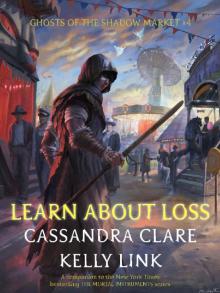 Learn About Loss (Ghosts of the Shadow Market Book 4)
Learn About Loss (Ghosts of the Shadow Market Book 4) Welcome to Shadowhunter Academy (Tales from the Shadowhunter Academy Book 1)
Welcome to Shadowhunter Academy (Tales from the Shadowhunter Academy Book 1)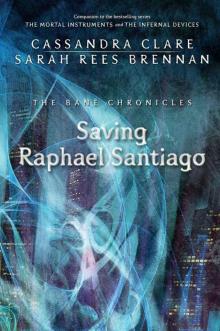 Saving Raphael Santiago tbc-6
Saving Raphael Santiago tbc-6 City of Bones mi-1
City of Bones mi-1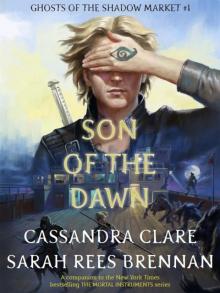 Ghosts of the Shadow Market Book 1_Son of the Dawn
Ghosts of the Shadow Market Book 1_Son of the Dawn Clockwork Princess (Infernal Devices, The)
Clockwork Princess (Infernal Devices, The) Clockwork Prince tid-2
Clockwork Prince tid-2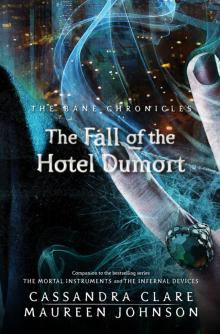 No Immortal Can Keep a Secret
No Immortal Can Keep a Secret A Deeper Love (Ghosts of the Shadow Market Book 5)
A Deeper Love (Ghosts of the Shadow Market Book 5) The Course of True Love (and First Dates)
The Course of True Love (and First Dates)